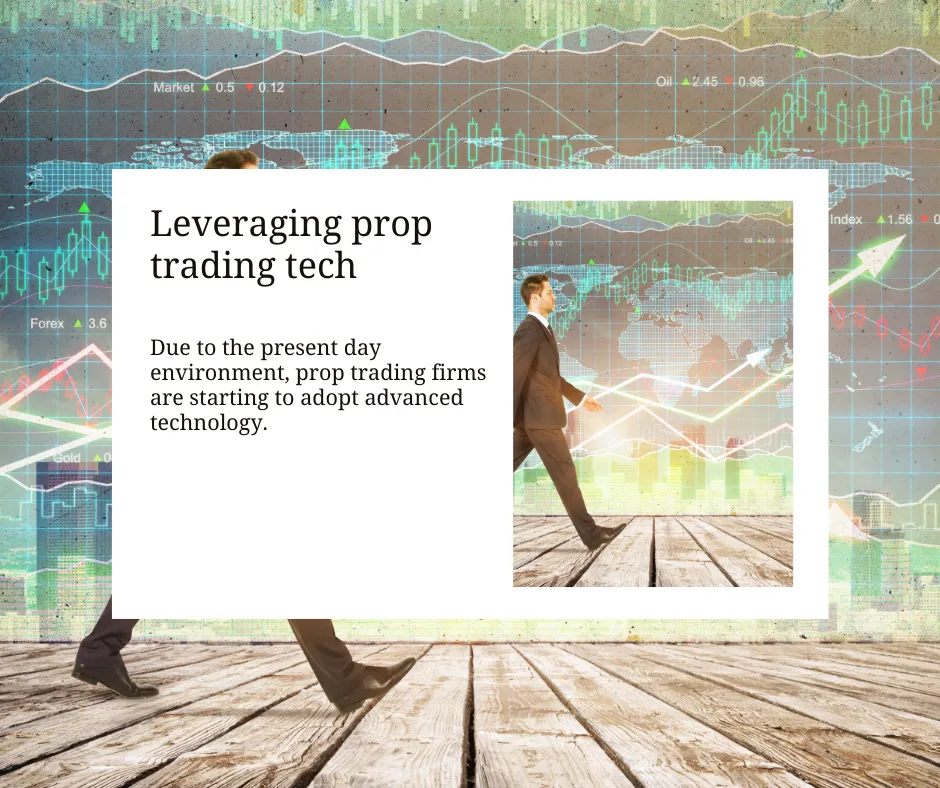Prop trading Tech:
Due to the present-day environment, prop trading firms are starting to adopt advanced technology. The appropriate techniques can greatly boost efficiency, enhance reasoning capabilities and increase profits. This article will provide insight into the recommended prop trading tech and its contribution to expanding the operational ranges of the firm.
What is Prop trading tech?
Prop trading technology can be characterised as the various equipment software or hardware used by firms engaged in proprietary trading. Such technologies help traders analyse market data, execute trades, manage their risks, and perform several other functions.
The following are some of the basic elements of prop trading tech:
- Trading Platforms: These platforms offer traders features for performing technical analysis, executing orders, and keeping an eye on the market.
- Data Analytics Tools: These tools enable a trader to examine and evaluate the market data, pinpoint its direction, and create robust trade analysis.
- Risk Management Systems: These systems assist traders in tracking their risk and slowing exposure level.
- Algorithmic Trading Software: Such software allows traders to implement trade strategies by dispatching orders at ultrafast speeds.
- Order Management Systems (OMS): These systems enable a trader to control his/her orders, make trades, and check their investment balance.
Over the years, technological advances in prop trading have kept pace with innovations in artificial intelligence and machine learning, and more recently cloud technology. Hence, it has made prop firms more effective and enhanced their competitiveness and profitability.
The Rise of Prop Trading in the UAE – A Thriving Hub for Traders:
Due to various factors, the USDA has established itself as a central hub for prop trading, drawing not only well-known companies but also many ambitious entrepreneurs in the process.
Several factors have contributed to the growth of the prop trading industry in the UAE:
Stimulating Regulatory Environment
The government in the UAE has enacted positive legislation that aids the growth of the financial services sector. Consequently, it is easier for prop trading businesses to commence and continue operations. The Dubai Financial Services Authority (DFSA) has a very good regulatory system in place which ensures integrity in the system.
Geographically Favourable
The United Arab Emirates (UAE) is located in the best possible position being at the centre of Europe, Asia, and Africa enabling them to reach new markets and new commodities to trade on. This geographical position has been one of the reasons to accentuate the growth of prop trading firms willing to expand their services in other regions.
Proper Technology
The United Arab Emirates (UAE) has advanced and developed some of the world’s best infrastructures such as high-speed internet, an assured electric power supply, and advanced technology. This infrastructure is very vital for the prop trading firms to conduct their businesses promptly and efficiently.
Educational Opportunities
The UAE is home to students and experienced professionals, such as traders from many regions. This aspect is significant in the enhancement of the prop talent traded within the region.
Support from the Government
The Financial Services sector has been encouraged by the UAE government which has offered deals and assistance for foreign direct investment and innovation. Over the years, this has assisted in the expansion of the prop trading industry.
Favourable Tax Structure
The corporate tax rate being 0% is one of the primary reasons making the UAE key for businesses including that of prop trading firms. The low taxation regime lessens the cost of operations, thus increasing the profit margins.
A Booming Financial Environment
The UAE possesses a particularly conducive financial environment, having an array of financial products and services. Such an environment enables the prop trading companies to have the necessary equipment and services to run efficiently.
How Prop Trading Works?
Proprietary trading, often expressed as prop trading, refers to a situation where a financial institution invests and trades securities in a financial market using its funds and not the clients’. Such institutions usually have skilled traders who implement various strategies aimed at reaping profits.
Here is how prop trading works in majority of the cases:
- Trader Selection: Prop firms hire members based on skill, experience, and performance of the members.
- Capital Allocation: The allotment of certain capital to the traders for trading activities by the firm.
- Trading Activities: The capital is then used by the traders to purchase and sell several financial instruments like: stocks, bonds, currencies, and derivatives.
- Profit Sharing: A trader and the firm form a profit-sharing ratio/is agreed, usually, there is a profit-sharing ratio where the firm takes some profit earned.
- Risk Management: Prop firms take a number of protection measures through internal controls and also control the traders themselves.
Scaling Your Firm with Prop Trading Tech:
- Streamline Processes: Implement the use of technology in doing away with tasks that are done repeatedly so as to allow the team to do more strategy-oriented tasks.
- Improving the Quality of Decisions: Use data-driven solutions and AI in order to make better trading decisions.
- Enhancing Capital Protection: Use state-of-the-art capital protection systems to be able to limit your risks and protect your investment.
- Increasing the Volume of Commerce: The relevant technology can enable your firm to grow sustainably and accommodate heightened levels of trading activities.
- Recruitment: When you adopt new technology, you outgrow your competitors and can get the best workforce.
Conclusion:
The use of prop trading tech would be a key consideration for growth and sustainable development of any trading firm. The appropriate acquisition of tools can lead to more effectiveness, better quality of decision-making, and superiority in the market. Always review your technology stack, particularly when the area of prop trading is rapidly changing, to make sure that your company is not left behind.

